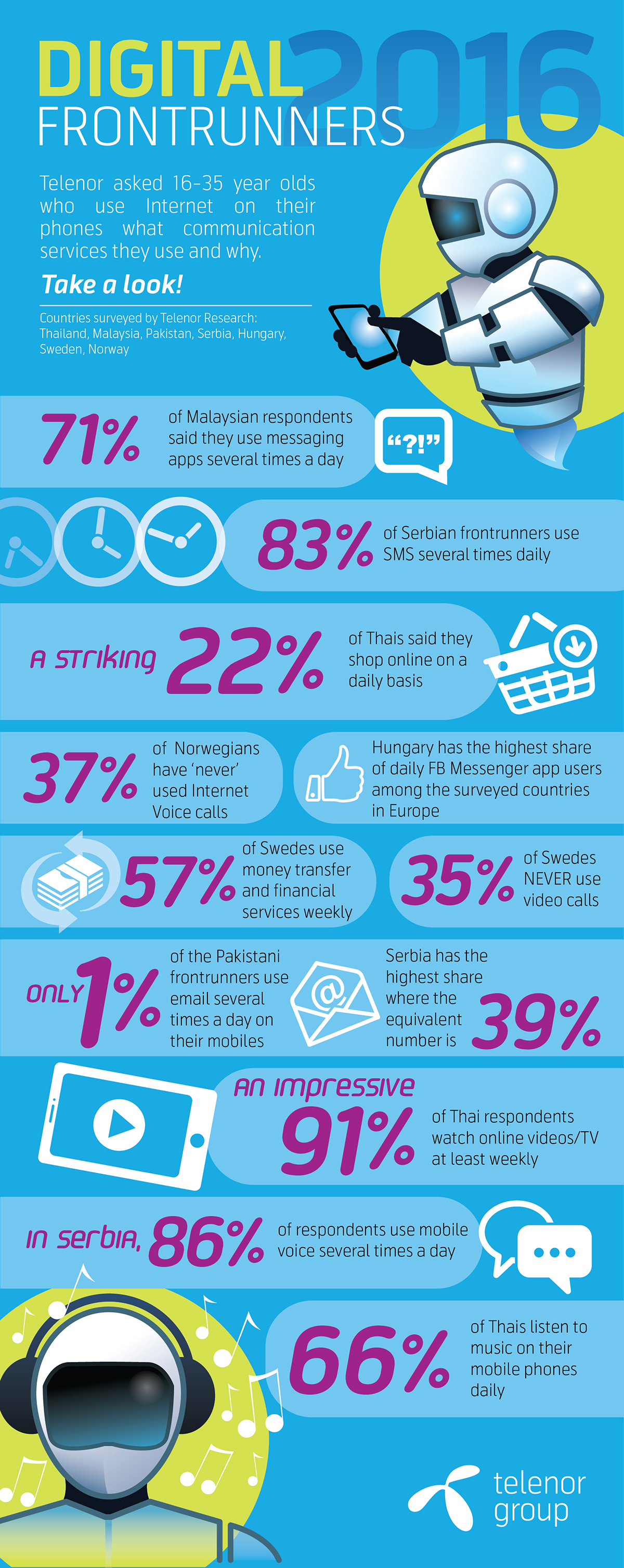23 June, 2016
ETNO ThinkDigital blog: Messaging Apps, SMS, Voice or Internet calls? Preferences vary among 16-35 year olds.
Bjørn Taale Sandberg, Head of Telenor Research: “The survey shows that the preferences differ from market to market. Traditional telco services like voice calls and SMS are still an important part of communication habits in most of the surveyed countries" #ThinkDigital
Telenor releases Digital Frontrunners study
In November-December 2015, Telenor Research carried out a study among mobile users aged 16-35 years old in Asian and European markets to better understand their communications habits.
The study surveyed “digital frontrunners”- digitally advanced young people who use Internet on their mobile phones - from Thailand, Malaysia, Pakistan, Norway, Sweden, Serbia, and Hungary.
The survey showed that Facebook is strengthening its position globally amongst digital frontrunners. However, while it is clear that most time is spent on messaging apps, today's young consumers still rate SMS and mobile calls as intrinsic to their communication habits.
And this year’s study shows that there is a new challenger on the market: watch out as internet calls gain momentum in Asia:
The way this group uses internet on their mobiles gives a good indication of future developments in communication services and how mobile internet usage will evolve in the years ahead. Compared to previous surveys carried out by Telenor Research, there is a general trend towards an increased use in Internet-based communication on mobile devices. But the survey also shows that preferences differ from market to market. Traditional telco services like voice calls and SMS are still an important part of the communication habits in most of the surveyed countries.
Traditional mobile calls are seen as the most important type of service in all countries, except Malaysia, even though they do not rate the highest in terms of time spent.
Malaysian and Thai frontrunners are the most "internetified"
A major shift in the communication market is clear in Malaysia while Thailand and Serbia seem to be hot on its heels. Indeed, Thailand and Malaysia are the most digital of Telenor's surveyed markets.
Malaysians stand out as the most eager users of messaging apps, with the vast majority (62%) ranking them as the most important communication tool. More than 80% of Malaysian frontrunners use messaging apps on a daily basis compared to 49% for SMS.
If we look back at the same survey from 2012, we can see that the numbers were the complete opposite. The strong role played by messaging apps today is mainly due to the success of WhatsApp amongst Malaysian frontrunners.
In Thailand, Internet voice calls (32%) are a close competitor to ordinary mobile calls (35%) in terms of "most important" communication tool.
Most talkative: old and new
Serbia stood out in the survey, albeit in another way compared to Malaysia.
Serbia has by far the highest share of frontrunners who use ordinary phone calls and SMS on a daily basis. The large majority use traditional mobile voice calls at least once a day (94%). Yet, they are on par with Malaysia and Thailand when it comes to frontrunners using messaging apps (85% use them daily).
Digital frontrunners in Hungary are ahead of their peers in Scandinavia and Pakistan when it comes to the daily use of messaging apps, but behind Serbia and the Asian markets. While messaging apps are used by more than 70 % of Hungarian frontrunners on a daily basis, almost half of these still rank ordinary voice calls as the most important service for mobile communication.
Embracing the new
Pakistan is an internet market still in the making, with traditional mobile calls and SMS dominating communication habits. However, its digital frontrunners have embraced the new opportunities provided by digital communications. Almost half of those surveyed use a variety of messaging apps (Facebook Messenger, WhatsApp and Viber are popular choices) and more than a third use internet voice and video calls on a daily basis.
This is the first time that Pakistan is included in the Digital Frontrunners survey and our findings resemble those of the Malaysian respondents in 2012. This suggests that Pakistani frontrunners may go down the same route as their Malaysian counterparts over the next one to three years, as internet access and smartphones become increasingly common.
Telco bias
In the mature mobile internet markets of Norway and Sweden, a high share of frontrunners still rate SMS and in particular mobile voice calls as the most important communication  tool. 38% of the Norwegian respondents and 34% of Swedish ones make traditional phone calls several times a day. This can partly be attributed to the fact that these services are often bundled into monthly subscriptions.
tool. 38% of the Norwegian respondents and 34% of Swedish ones make traditional phone calls several times a day. This can partly be attributed to the fact that these services are often bundled into monthly subscriptions.
Scandinavians also appear to use less of their communication time on internet-based options compared to their peers in the other markets, with Pakistan as the exception. However, internet messaging is still on the rise. In Norway, 64% say they use messaging apps at least once a day and the growth in daily use of messaging apps in Sweden has exploded from 14% to 55% over three years.
The Facebook family consolidates its position
Messaging apps are the winners in the brave new digital world - particularly in mature markets. Malaysia, Thailand and Serbia are at the forefront of frequent daily usage. With services such as Facebook Messenger and WhatsApp under its umbrella, Facebook Inc. is the overall leader. Still, its strongest competitor varies from market to market. In Serbia, Viber is by far the most important internet-based service, whereas Line has the strongest position amongst the Thais in much the same way as WhatsApp has taken a dominating position in Malaysia. In Norway, Facebook Messenger has now caught up with Snapchat's previously dominant position as the most popular communication app.
Despite the popularity of internet-based messaging, traditional SMS is still important for frontrunners in Scandinavia, Pakistan and in particular Serbia.
New contender: Internet calling
In addition to a hunger for messaging apps, Thai frontrunners have the highest consumption of, and strongest preference for, new frontline services such as internet voice calls (65% ) and video calls (52%) compared to all surveyed markets in terms of daily use.
Serbian frontrunners come closely behind the Thais, but beat their European peers in terms of daily users of internet voice calls (49%) and video calls (30%).
Surprisingly, internet and video calls are not so popular amongst Scandinavian frontrunners: More than a third of respondents in Norway and Sweden never call via the internet (voice or video). This is remarkably low considering the broad availability of internet access and smartphones on the market. Only 5% of Norwegian frontrunners use video calls on a daily basis.
Games, music & fun
Across the surveyed countries, frontrunners use mobile for a wide set of activities. The majority use it to browse and communicate on a daily basis, but also to listen to music, watch videos and share photos on a weekly basis. Mobile-gaming is popular across all markets, particularly with Thai, Malaysian and Hungarian frontrunners.
An impressive 22% of Thais say they shop online on a daily basis compared to 3% in Norway. This could be attributed to the popularity of LINE, which also serves as a payment platform.
The Swedes have the highest share of users who use mobile to transfer money or use financial services on a weekly basis (57%), followed by Thailand (49%) and Norway (44%).
Pakistan is the only surveyed country in which a larger share use their mobile phones for communicating on the internet rather than to browse. In all the other six countries, browsing is the most-done activity.
You've got mail
Despite assumptions that internet communication is moving away from email to social media, email is used on mobile by a fair share of frontrunners in all surveyed markets except in Pakistan. Serbia has the highest share who use it several times a day (39%) with Malaysia (33%), Thailand (33%) and Hungary (32%) more or less on par. Norway (26%) and Sweden (24%) have fairly similar email habits, whereas Pakistan stands out in this regard with a remarkably low share using email on their phones on a daily basis (1%).
By Bjørn Taale Sandberg for ETNO #ThinkDigital, 23.06.2016
***
Bjørn Taale Sandberg, Senior Vice President and Head of Telenor Research, Telenor
Bjørn Taale Sandberg joined Telenor in 2000 and is Senior Vice President and Head of Telenor Research. Previously, he served as CEO of AeroMobile Ltd, based in the UK, Chief Marketing Officer in Telenor Pakistan and Head of Strategy for Telenor Mobile Communications.
Sandberg has a Master in Computer Science from the University of Oslo and a Master of Management from the Norwegian Business School (BI).
Telenor Research is Telenor’s internal scientific research unit. The unit works with Telenor’s 13 subsidiaries and external academic and industry organisations on research into regulatory, competition, customer, technology and organisational development issues relevant to Telenor and the industry. Telenor Research publishes regularly in scientific journals and functions as an advisor to the top management.


